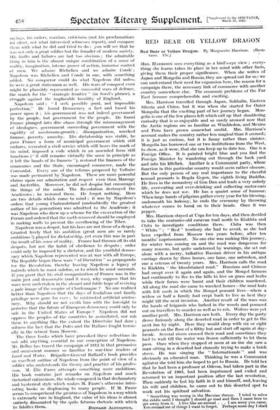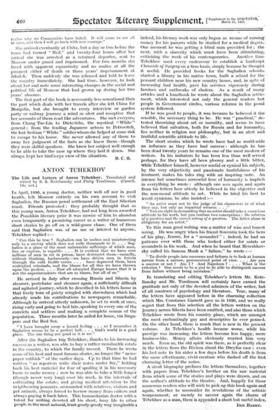RED BEAR OR YELLOW DRAGON
Mits. HARRISON sees everything as a bird's-eye view ; every- thing she learns takes its place in her mind with other facts, giving them their proper 'significance. When she writes of
Japan and Mongolia and Russia,they are spread out for us : we can understand their need for expansion here, the reason for a campaign there, the necessary link of commerce with another country somewhere else.. The economic problems of the Far East become comprehensible and exciting.
Mrs. Harrison travelled through Japan, Sakhalin, Eastern Siberia and China, but it was when she started for Outer Mongolia that the exciting part of her journey began. Mon- golia is one of the few places left which call up that shuddering curiosity that is so enjoyable and so rarely aroused now that the Arctic regions are as familiar as Wimbledon, and Mexico and Peru have grown somewhat sordid. Mrs. Harrison's account makes the country rather less magical than it seemed ; it is just as curious, but it is funny rather than sinister. Mongolia has borrovied one or two institutions from the West, to show, as it were, that she can keep up to date too. One is a Foreign Office. It is painted bright blue and you fund the
Foreign Minister by wandering out through the back yard and into his kitchen. Another is a Communist party, whose
function in this particular country would seem rather obscure.
But the only person of any real importance' to the cheerful nomad peasants is Bogda Gegen, the eighth living Buddha.
He lives in the monastery of Gon Dan and leads a very unholy life, over-eating and Over-drinking and collecting motor-cars which he does not' use. He has a quaint sense of humour.
When large bands of pilgrims gather every year for his blessing, underneath his balcony, he ends the ceremony by throwing whatever comes to hand on to their heads. Once it was pepper.
Mrs. Harrison stayed at Urge for ten days, and then decided to take the centuries-old caravan trail north to Kiakhta and Chita to investigate conditions there. Chita was then " White " ; " Red " territory she had to avoid, as she had been expelled from Moscow two years before, after ten months' imprisonment. No one else was making this journey, for winter was coming on and the road was dangerous for many reasons, but quite undeterred by warnings, she set out alone with a merry, talkative Russian driver in his antique carriage drawn by three horses, one lame, one unbroken, and one a veteran of twenty years. Mrs. Harrison calls the road to Kiakhta the bloodstained road." Russians and Chinese
had swept over it again and again, and the Mongol farmers had continually to flee to the, hills to live on grass and herbs
while their farms were burnt and their children murdered.
All along the road she came to wrecked homes—the mud huts with felt roofs in which the Mongol peasant lives—where a widow or half a family had crept back to live as best they might till the next invasion. Another result of the wars was the bands of brigands who lurked in the woods and pounced
out on travellers to murder as well as to rob. Wolves were yet another peril. Mrs. Harrison saw both. Every day the party drove furiously along the deserted road in order to get to the next inn by night. Here they would sleep with six or eight peasants on the floor of a filthy but and start off again at day- break. Several rivers crossed their road and sometimes they had to wait till the water was frozen sufficiently to let them pass. Once when they stopped at noon at an inn she saw. a mart sitting M a deserted but clumsily trying to make a brick stove. He was singing the " Internationale " and was obviously an educated man. Thinking he was a Communist agitator she told him she hoped to get to Russia. He told her that he had been a professor at Odeisa,-had taken part in the Revolution of 1905, had been imprisoned and exiled and returned' to 'an important position after the last revolution. Then suddenly he lost his faith in it and himself, and, leaving his wife and children, he came out to this deserted spot to work out his spiritual salvation.
" Something was wrong in the Marxian theory. I tried to solve the riddle until I thought I should go mad and then I came hem to get away from it. I live like an-animal . . . I am sorry you came. You remind me of things I want to forget. Perhaps some day I shall
realise why we Communists have failed. It will come to me all at once, and then I will go back with new courage."
She arrived eventually at Chita, but a day or two before the town had turned " Red," and twenty-four hours after her arrival she was arrested as a returned deportee, sent to Moscow under guard and imprisoned. For two months she faced with apparent equanimity and no malice at all the prospect either of death or three years' imprisonment at Irkutsk. Then suddenly she was released and told to leave the country immediately. She had time, however, to look about her and note some interesting changes in the social and political life of Moscow that had grown up during her two years' absence.
The first part of the book is necessarily less sensational than the part which deals with her travels after she left China for Mongolia, but she brought to every interview or garden party or railway journey a mind so alert and receptive that her accounts of them read like adventures. She met everyone from Chang Tso-Lin to Dieterichs, the mystical " White " general ; from the leading Japanese actress to Petrovitch, the lost Serbian " White " soldier whom she helped at some risk to escape to his home. She never allowed any of them to sway her judgment of the facts as she knew them—though they were skilful speakers. She knew her subject well enough to be able to take the case up where they laid it down. She always kept her bird's-eye view of the situation. B. C. :B.























































 Previous page
Previous page